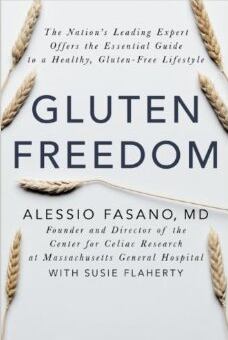“If I knew the answer to this question, I’d be in line for the Nobel Prize,” says Alessio Fasano, M.D., a world-renowned pediatric gastroenterologist and research scientist who founded the University of Maryland Center for Celiac Research in 1996. (The Center moved to Massachusetts General Hospital in 2013.)
Dr Fasano, who published the groundbreaking study in the Annals of Medicine in 2003 that established the prevalence rate of celiac disease at one in 133 people in the US, was speaking to FoodNavigator-USA as part of our special edition on the gluten-free market.
He says: “There must be some environmental factors that explain why most people [with the genetic predisposition] eat gluten all their lives and stay healthy, and others lose their tolerance. And it could happen at any time. Some people don’t become celiac until they are in their 70s. You’re not out of the woods at any age.
“The genome is like a marble block. What it will become in terms of a sculpture depends on the environment. Even if we inherit these genes they are not always functional or expressed.
“We also know that prevalence is rising and we’re in the midst of an epidemic. Based on our study it seems that prevalence has doubled every 15 years in North America. Why? I think it goes back to the microbiome. There are antibiotics, our diet has changed, we travel more. There have been so many changes in the past 50 years.”
Can we identify the changes in the microbiome that make us unable to handle gluten? And can we make interventions?
The gut flora of people with celiac disease - an autoimmune disease that damages the villi of the small intestine and interferes with absorption of nutrients from food, causing serious health problems if undiagnosed - is different from those without it, he says.
“Is this coincidence or cause and effect? What we know is that at any time in your life, whether through infections, traveling, antibiotics, pregnancy or whatever, the composition of the gut can shift from a friendly balance that keeps the immune system in check to an unfriendly place that will put the immune system on high alert.

“Can we identify the changes in the microbiome that make us unable to handle gluten?”
If you look at how the microbiome changes over time in people that have the genetic predisposition and go on to develop celiac disease, versus those that have the genetic predisposition but don’t develop celiac disease, you can try and pinpoint when, why and how these changes take place he says.
“And that’s exactly what we are doing right now with a larger scale study. Does the microbiome shift in months or years and can we intervene to re-establish order? That would be the Holy Grail.”
But even if we can step in and try to stop the downward spiral, it is highly unlikely that a one-size fits probiotic or prebiotic could be the solution, he predicts.
“Interventions would need to be customized. We’re moving targets. But I would not be shocked in 10 years from now if we can do this.”
When is the best time to introduce gluten to infants?
One thing we do know isthat the timing of our initial exposure to gluten is important, with infants fed too early (2-4 months) showing a far greater likelihood of developing celiac disease, he says.

“In the 1970s in Sweden a company introduced a fortified formula with gluten for babies as young as 2-4 months and the prevalence of celiac disease went from 1% to 9%. It was taken off the market.”
However, others argue that introducing gluten too late may also put people at higher risk and say we must find the window of opportunity when it is best to start adding gluten to the diet to reduce the risk of developing celiac disease, he says.
“When this [sweet spot] might be is what we are trying to find out now through a larger scale study. There are different schools of thought on this. Some say it’s best to introduce gluten around 4-7 months while the baby is also being breast fed. Others say delay it for a year.
“To establish this you need very long prospective studies, and one is coming to fruition now, so we’ll have the results later this year.
“All I can say right now is that the maturation of our immune system in the first years of life depends heavily on the composition of this bacteria in our gut.”
Diagnosis of celiac disease: ‘The problem is that it’s such a clinical chameleon.’
As for the diagnosis of celiac disease (in 2003 it took on average 11 years from the onset of symptoms to a confirmed diagnosis), things have improved a little, but the average time is still 5-6 years, and many still go undiagnosed, he says.
“The problem is that it’s such a clinical chameleon. Some people have no gastrointestinal symptoms whatsoever, and no one presents in the same way. The most common way that it presents itself is anemia, but this too is changing over time.”

We’re working hard on biomarkers. All we know is what gluten sensitivity is not
So what about gluten sensitivity? How do we know that 6% of people are estimated to have it in the US, given that there are no validated biomarkers/diagnostic tests to prove it?
And is there a consensus in the scientific community that it even exists (researchers behind a high-profile study in Gastroenterology raised some questions about this last year)?
Says Dr Fasano: “There is a tremendous amount of skepticism, but in the last two years, the debate has shifted from does it exist - and I think people agree that it does - to what is it, and is it gluten alone that is triggering these people’s symptoms or something else in these grains or something in combination with gluten?
“We’re working hard on biomarkers. But I think where we are with gluten sensitivity is where we were with celiac disease 20 years ago.
“All we know is what gluten sensitivity is not. It’s not celiac disease and it’s not wheat allergy. If you have symptoms which you believe are triggered by gluten and you have ruled out celiac disease [via a blood test for certain antibodies confirmed by an intestinal biopsy] and wheat allergy, then you can try a gluten-free diet and see if things improve.”
Celebrity gluten-bashing: This really aggravates me. The gluten-free diet is not the South Beach diet

However, Dr Fasano has little time for the celebrity wheat- and gluten-bashers that are “jumping on the lifestyle bandwagon”.
He adds: “This really aggravates me. The gluten-free diet is not the South Beach diet. For celiacs, it’s a medical necessity. We need to clarify the message, which is what I wanted to do with a book that’s’ coming out in May called Gluten Freedom.”
A spate of popular science books (Grain Brain, Wheat Belly etc) arguing that our bodies weren’t designed to cope with gluten has also raised his hackles, he says.
It’s true that it's only relatively recently in evolutionary terms that we started to eat gluten. But for most of us, our bodies handle it just fine
What is quite clear is that "most of our bodies cope with gluten just fine", even though it’s also true that we only started farming gluten-containing crops a few thousand years ago, which in evolutionary terms, is a blink of an eye, he says.
“We don’t digest gluten completely, which is unlike any other protein. The immune system seems to see the gluten as a component of bacteria and deploys weapons to attack it, and creates some collateral damage we call inflammation.
"But our bodies are engaging in this war all the time, and for the vast majority of us, there’s a controlled reaction, the enemies are defeated and nothing happens. Very few people eventually lose this battle and may develop celiac disease, gluten sensitivity or wheat allergy.
“So if you argue on that basis that we should all go gluten free, it’s like saying that we should all get rid of germs or bacteria. That’s ridiculous. Our bodies deal with bacteria all the time. We’re awash with them.”
DON'T MISS THE FOODNAVIGATOR-USA FORUM: GLUTEN-FREE IN PERSPECTIVE
11.30am EST, April 30, 2014.
Find out more about gluten-free market trends and growth opportunities; the science behind celiac disease, gluten intolerance and wheat allergy; the technical challenges of formulating great-tasting gluten-free products; and the latest consumer research.
This LIVE online panel debate moderated by FoodNavigator-USDA editor Elaine Watson brings together Dr Fasano and TJ Mcintyre from leading gluten-free manufacturer Boulder Brands (Udis, Glutino); Dr David Sheluga, director of commercial insights at food and ingredients giant ConAgra Foods; and Tom Vierhile, innovation insights director at Datamonitor.
